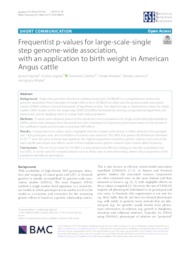Frequentist p-values for large-scale-single step genome-wide association, with an application to birth weight in American Angus cattle.
Frequentist p-values for large-scale-single step genome-wide association, with an application to birth weight in American Angus cattle.
Author(s): AGUILAR, I.; LEGARRA, A.; CARDOSO, F. F.; MASUDA, Y.; LOURENCO, D.; MISZTAL, I.
Summary: Background: Single-step genomic best linear unbiased prediction (SSGBLUP) is a comprehensive method for genomic prediction. Point estimates of marker effects from SSGBLUP are often used for genome-wide association studies (GWAS) without a formal framework of hypothesis testing. Our objective was to implement p-values for singlemarker GWAS studies within the single-step GWAS (SSGWAS) framework by deriving computational algorithms and procedures, and by applying these to a large beef cattle population. Methods: P-values were obtained based on the prediction error (co)variances for single nucleotide polymorphisms (SNPs), which were obtained from the prediction error (co)variances of genomic predictions based on the inverse of the coefficient matrix and formulas to estimate SNP effects. Results: Computation of p-values took a negligible time for a dataset with almost 2 million animals in the pedigree and 1424 genotyped sires, and no inflation of statistics was observed. The SNPs that passed the Bonferroni threshold of 10-5.9 were the same as those that explained the highest proportion of additive genetic variance, but even at the same significance levels and effects, some of them explained less genetic variance due to lower allele frequency. Conclusions: The use of a p-value for SSGWAS is a very general and efficient strategy to identify quantitative trait loci (QTL). It can be used for complex datasets such as those used in animal breeding, where only a proportion of the pedigreed animals are genotyped.
Publication year: 2019
Types of publication: Journal article
Observation
Some of Embrapa's publications are published as ePub files. To read them, use or download one of the following free software options to your computer or mobile device. Android: Google Play Books; IOS: iBooks; Windows and Linux: Calibre.
Access other publications
Access the Agricultural Research Database (BDPA) to consult Embrapa's full library collection and records.
Visit Embrapa Bookstore to purchase books and other publications sold by Embrapa.

